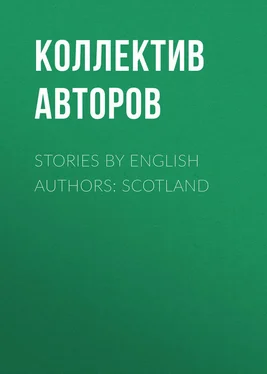Коллектив авторов - Stories by English Authors - Scotland
Здесь есть возможность читать онлайн «Коллектив авторов - Stories by English Authors - Scotland» — ознакомительный отрывок электронной книги совершенно бесплатно, а после прочтения отрывка купить полную версию. В некоторых случаях можно слушать аудио, скачать через торрент в формате fb2 и присутствует краткое содержание. Жанр: foreign_antique, foreign_prose, на английском языке. Описание произведения, (предисловие) а так же отзывы посетителей доступны на портале библиотеки ЛибКат.
- Название:Stories by English Authors: Scotland
- Автор:
- Жанр:
- Год:неизвестен
- ISBN:нет данных
- Рейтинг книги:3 / 5. Голосов: 1
-
Избранное:Добавить в избранное
- Отзывы:
-
Ваша оценка:
- 60
- 1
- 2
- 3
- 4
- 5
Stories by English Authors: Scotland: краткое содержание, описание и аннотация
Предлагаем к чтению аннотацию, описание, краткое содержание или предисловие (зависит от того, что написал сам автор книги «Stories by English Authors: Scotland»). Если вы не нашли необходимую информацию о книге — напишите в комментариях, мы постараемся отыскать её.
Stories by English Authors: Scotland — читать онлайн ознакомительный отрывок
Ниже представлен текст книги, разбитый по страницам. Система сохранения места последней прочитанной страницы, позволяет с удобством читать онлайн бесплатно книгу «Stories by English Authors: Scotland», без необходимости каждый раз заново искать на чём Вы остановились. Поставьте закладку, и сможете в любой момент перейти на страницу, на которой закончили чтение.
Интервал:
Закладка:
When his wife was but newly dead, and his Janet just a smart elf-locked lassie running to and from the school, Gavin got too much in the way of “slippin’ doon by.” When Janet grew to be woman muckle, Gavin kept the habit, and Janet hardly knew that it was not the use and wont of all fathers to sidle down to a contiguous Railway Arms, and return some hours later with uncertain step, and face pricked out with bright pin-points of red – the sure mark of the confirmed drinker of whisky neat.
They were long days in the cottage at the back of Barbrax Long Wood. The little “but an’ ben” was whitewashed till it dazzled the eyes as you came over the brae to it and found it set against the solemn depths of dark-green firwood. From early morn, when she saw her father off, till the dusk of the day, when he would return for his supper, Janet Balchrystie saw no human being. She heard the muffled roar of the trains through the deep cutting at the back of the wood, but she herself was entirely out of sight of the carriagefuls of travellers whisking past within half a mile of her solitude and meditation.
Janet was what is called a “through-gaun lass,” and her work for the day was often over by eight o’clock in the morning. Janet grew to womanhood without a sweetheart. She was plain, and she looked plainer than she was in the dresses which she made for herself by the light of nature and what she could remember of the current fashions at Merrick Kirk, to which she went every alternate Sunday. Her father and she took day about. Wet or shine, she tramped to Merrick Kirk, even when the rain blattered and the wind raved and bleated alternately among the pines of the Long Wood of Barbrax. Her father had a simpler way of spending his day out. He went down to the Railway Inn and drank “ginger-beer” all day with the landlord. Ginger-beer is an unsteadying beverage when taken the day by the length. Also the man who drinks it steadily and quietly never enters on any inheritance of length of days.
So it came to pass that one night Gavin Balchrystie did not come home at all – at least, not till he was brought lying comfortably on the door of a disused third-class carriage, which was now seeing out its career anchored under the bank at Loch Merrick, where Gavin had used it as a shelter. The driver of the “six-fifty up” train had seen him walking soberly along toward The Huts (and the Railway Inn), letting his long surface-man’s hammer fall against the rail-keys occasionally as he walked. He saw him bend once, as though his keen ear detected a false ring in a loose length between two plates. This was the last that was seen of him till the driver of the “nine-thirty-seven down” express – the “boat-train,” as the employees of the P.P.R. call it, with a touch of respect in their voices – passed Gavin fallen forward on his face just when he was flying down grade under a full head of steam. It was duskily clear, with a great lake of crimson light dying into purple over the hills of midsummer heather. The driver was John Platt, the Englishman from Crewe, who had been brought from the great London and Northwestern Railway, locally known as “The Ell-nen-doubleyou.” In these remote railway circles the talk is as exclusively of matters of the four-foot way as in Crewe or Derby. There is an inspector of traffic, whose portly presence now graces Carlisle Station, who left the P.P.R. in these sad days of amalgamation, because he could not endure to see so many “Sou’west” waggons passing over the sacred metals of the P.P.R. permanent way. From his youth he had been trained in a creed of two articles: “To swear by the P.P.R. through thick and thin, and hate the apple green of the ‘Sou’west.’” It was as much as he could do to put up with the sight of the abominations; to have to hunt for their trucks when they got astray was more than mortal could stand, so he fled the land.
So when they stopped the express for Gavin Balchrystie, every man on the line felt that it was an honour to the dead. John Platt sent a “gurring” thrill through the train as he put his brakes hard down and whistled for the guard. He, thinking that the Merrick Viaduct was down at least, twirled his brake to such purpose that the rear car progressed along the metals by a series of convulsive bounds. Then they softly ran back, and there lay Gavin fallen forward on his knees, as though he had been trying to rise, or had knelt down to pray. Let him have “the benefit of the doubt” in this world. In the next, if all tales be true, there is no such thing.
So Janet Balchrystie dwelt alone in the white “but an’ ben” at the back of the Long Wood of Barbrax. The factor gave her notice, but the laird, who was not accounted by his neighbours to be very wise, because he did needlessly kind things, told the factor to let the lassie bide, and delivered to herself with his own handwriting to the effect that Janet Balchrystie, in consideration of her lonely condition, was to be allowed the house for her lifetime, a cow’s grass, and thirty pound sterling in the year as a charge on the estate. He drove down the cow himself, and having stalled it in the byre, he informed her of the fact over the yard dyke by word of mouth, for he never could be induced to enter her door. He was accounted to be “gey an’ queer,” save by those who had tried making a bargain with him. But his farmers liked him, knowing him to be an easy man with those who had been really unfortunate, for he knew to what the year’s crops of each had amounted, to a single chalder and head of nowt.
Deep in her heart Janet Balchrystie cherished a great ambition. When the earliest blackbird awoke and began to sing, while it was yet gray twilight, Janet would be up and at her work. She had an ambition to be a great poet. No less than this would serve her. But not even her father had known, and no other had any chance of knowing. In the black leather chest, which had been her mother’s, upstairs, there was a slowly growing pile of manuscript, and the editor of the local paper received every other week a poem, longer or shorter, for his Poet’s Corner, in an envelope with the New Dalry postmark. He was an obliging editor, and generally gave the closely written manuscript to the senior office boy, who had passed the sixth standard, to cut down, tinker the rhymes, and lope any superfluity of feet. The senior office boy “just spread himself,” as he said, and delighted to do the job in style. But there was a woman fading into a gray old-maidishness which had hardly ever been girlhood, who did not at all approve of these corrections. She endured them because over the signature of “Heather Bell” it was a joy to see in the rich, close luxury of type her own poetry, even though it might be a trifle tattered and tossed about by hands ruthless and alien – those, in fact, of the senior office boy.
Janet walked every other week to the post-office at New Dalry to post her letters to the editor, but neither the great man nor yet the senior office boy had any conception that the verses of their “esteemed correspondent” were written by a woman too early old who dwelt alone at the back of Barbrax Long Wood.
One day Janet took a sudden but long-meditated journey. She went down by rail from the little station of The Huts to the large town of Drum, thirty miles to the east. Here, with the most perfect courage and dignity of bearing, she interviewed a printer and arranged for the publication of her poems in their own original form, no longer staled and clapper-clawed by the pencil of the senior office boy. When the proof-sheets came to Janet, she had no way of indicating the corrections but by again writing the whole poem out in a neat print hand on the edge of the proof, and underscoring the words which were to be altered. This, when you think of it, is a very good way, when the happiest part of your life is to be spent in such concrete pleasures of hope, as Janet’s were over the crackly sheets of the printer of Drum. Finally the book was produced, a small rather thickish octavo, on sufficiently wretched gray paper which had suffered from want of thorough washing in the original paper-mill. It was bound in a peculiarly deadly blue, of a rectified Reckitt tint, which gave you dazzles in the eye at any distance under ten paces. Janet had selected this as the most appropriate of colours. She had also many years ago decided upon the title, so that Reckitt had printed upon it, back and side, “The Heather Lintie,” while inside there was the acknowledgment of authorship, which Janet felt to be a solemn duty to the world: “Poems by Janet Balchrystie, Barbrax Cottage, by New Dalry.” First she had thought of withholding her name and style; but, on the whole, after the most prolonged consideration, she felt that she was not justified in bringing about such a controversy as divided Scotland concerning that “Great Unknown” who wrote the Waverley Novels.
Читать дальшеИнтервал:
Закладка:
Похожие книги на «Stories by English Authors: Scotland»
Представляем Вашему вниманию похожие книги на «Stories by English Authors: Scotland» списком для выбора. Мы отобрали схожую по названию и смыслу литературу в надежде предоставить читателям больше вариантов отыскать новые, интересные, ещё непрочитанные произведения.
Обсуждение, отзывы о книге «Stories by English Authors: Scotland» и просто собственные мнения читателей. Оставьте ваши комментарии, напишите, что Вы думаете о произведении, его смысле или главных героях. Укажите что конкретно понравилось, а что нет, и почему Вы так считаете.












